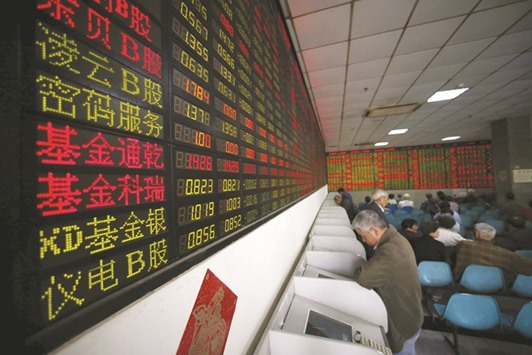There is little relief in sight for China’s beleaguered stock traders.
The Shanghai Composite Index will fall to 2,850 by the end of September, sliding 2.7% in a third straight quarterly decline, according to the median forecast in a Bloomberg poll of six strategists and fund managers.
A deepening economic slowdown, the possibility of a yuan devaluation and selling by insiders were seen weighing on mainland equities, the survey showed.
China’s benchmark stock gauge has tumbled 15% this year, one of the steepest declines among 94 global indexes tracked by Bloomberg, as investors pulled out of equities in the aftermath of 2015’s $5tn summer rout.
The slowest economic expansion in more than two decades is weighing on corporate earnings, while a weakening yuan is spurring the risk of capital outflows. “The downside risk on the economy is building up and a weak economy is adding pressure to the yuan,” said Li Lifeng, a Shanghai-based strategist at Sinolink Securities Co, who participated in the survey.
“In this scenario, stocks are unlikely to perform well.” He predicts the Shanghai Composite will fall to about 2,800 by the end of September.
Of another five respondents in the survey who didn’t have an index target, three saw the Shanghai measure ending this quarter little changed and two predicted an advance.
Yuanta Securities Co expects the gauge to trade between 2,600 and 3,100 by the end of the period.
The Shanghai Composite added 0.6% on Tuesday to close above the 3,000 level for the first time since April 19.
Turnover on the gauge has tumbled almost 80% since last year’s peak, while the value of loans taken to buy equities is near the lowest since 2014.
MSCI last month decided against adding mainland shares to global benchmark indexes and the start date of a long-delayed link between Shenzhen and Hong Kong exchanges has yet to be announced.
Investors should avoid companies most exposed to economic cycles as a slowdown deepens, while consumer and technology stocks may outperform as the government reorients the economy around services, according to the survey.
There is little sign of improvement in China’s traditional smokestack parts of the economy, with a manufacturing gauge from Caixin Media and Markit Economics falling to 48.6 in June from 49.2 in May, below the 50 line that signals contraction. Other areas are showing more resilience.
The government’s gauge of services climbed to 53.7 last month, the highest in three months.
The best performers among Chinese industry groups in the past quarter were consumer companies.
Kweichow Moutai Co jumped 18% during the span after earnings recovered as more people consumed the high-end liquor on affordable prices. Technology shares rose 1.1%, led by Searainbow Holding Corp and Beijing Ultrapower Software Co.
Investor appetite for stocks will also pivot on whether the government succeeds in pushing through policies to make the economy more services- and market-based, according to Shen Zhengyang, a strategist at Northeast Securities Co in Shanghai.
“Reform expectations are a big uncertainty,” he said. “People will lose confidence if there are no upcoming policies that will improve market expectations.”
The participants in the Bloomberg survey that provided index targets were AXA SPDB Investment Managers, Central China Securities Co, Jinkuang Investment Management, KGI Securities Co, Northeast Securities Co and Sinolink Securities.
Beijing StarRock Investment Management Co, Bocom International Holdings Co, Macquarie Bank, Standard Chartered and UOB-Kay Hian also took part.

Investors look at computer screens showing stock information at a brokerage house in Shanghai. The Shanghai Composite Index will fall to 2,850 by the end of September, sliding 2.7% in a third straight quarterly decline, according to the median forecast in a Bloomberg poll of six strategists and fund managers.
